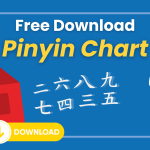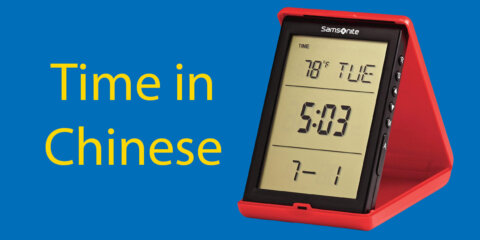Learn How to Greet Someone in Chinese 👋🏽 Top 10 Chinese Greetings
Don’t just use 你好 ! Today we teach you some of the best Chinese Greetings and how to use them!

We want to get you speaking Chinese in a way that sounds natural will require you to learn more than the quintessential 你好 nǐ hǎo (hello) or 你好吗 nǐ hǎo ma (how are you?).
As a matter of fact, using these very basic expressions in certain situations may sound weird or unnatural to a native speaker.
If you want to impress your Chinese friends or just want to make a great impression when visiting China, you should learn how and when to use the different ways to greet people in Chinese.
This guide will cover 10 essential greetings in Chinese that you need to master before visiting China.
Greetings in Chinese #1 | 你好 nǐ hǎo / 您好 nín hǎo
Greetings in Chinese #2 | 大家好 dàjiā hǎo
Greetings in Chinese #3 | 最近你怎么样?zuìjìn nǐ zěnme yàng
Greetings in Chinese #4 | 吃了吗 chīle ma / 吃过饭了没有?chīguò fànle méiyǒu
Greetings in Chinese #5 | 喂 wèi
Greetings in Chinese #6 | 早上好 zǎoshang hǎo / 早 zǎo
Greetings in Chinese #7 | 晚上好 wǎnshàng hǎo
Greetings in Chinese #8 | 好久不见!hǎojiǔ bùjiàn
Greetings in Chinese #9 | 去哪儿?qù nǎ’er
Greetings in Chinese #10 | 嘿 hēi / 嗨 hāi / 哈喽 hā lóu / 哈罗 hā luō
BONUS FREEBIE | Quickfire Quiz
Greetings in Chinese | FAQ’s
Chinese Greetings #1 | 你好 / 您好
你好 nǐ hǎo is probably the first phrase all Chinese students are taught on their first day of class.
This is the most basic way of saying ‘Hello’ and literally means “you good.”

FACT – Although this Chinese greeting is still correct and relatively common, most Chinese speakers seldom use it as a way to greet their friends, colleagues, or even acquaintances.
This is especially true for the younger generation, who consider this phrase to be antiquated and opt for more colloquial greetings (more on this below).
您好 nín hǎo is a more formal variation of 你好 nǐ hǎo that is used to address people who are your superiors in a professional or familial setting.
If you want to show respect for your boss or your significant other’s parents, you would want to use 您好 nín hǎo instead of 你好 nǐ hǎo.
您好 nín hǎo is also a very common way for businesses, computer software, phone apps, websites, etc. to address their users. So when you sign up for any of the most common Chinese apps, they will likely greet you with a respectful 您好 nín hǎo.
Chinese Greetings #2 | 大家好

This is a variation of 你好 nǐ hǎo where 你 (you) nǐ is replaced with 大家 (everyone) dàjiā.
This changes the meaning from an individual ‘Hello’ to a ‘Hello everyone’.
Unlike 你好 nǐ hǎo, 大家好 dàjiā hǎo is still a very common way to greet large groups of people and even large crowds.
If you find yourself in a situation where you have to give a speech to a Chinese audience, you will certainly want to start with 大家好 dàjiā hǎo!
BONUS: You can replace 大家 (everyone) dàjiā with almost almost any title or profession to make a more personalised greeting, such as 老师好 (hello teacher) lǎoshī hǎo or 朋友们好 (hello friends) péngyǒumen hǎo.
Chinese Greetings #3 | 最近你怎么样?
Most Chinese students are familiar with 你好吗 nǐ hǎoma, which is the most commonly-taught way of asking someone ‘How are you?’.

However, the most common way of actually asking your friends how they are doing is 最近你怎么样? zuìjìn nǐ zěnme yàng, which translates to “How have you been recently?”
Colloquially, it’s used more like “How have you been?”.
As a matter of fact, 最近 zuìjìn can be used before pretty much any other question that you’d like to ask your friends when you want an update from the last time you saw them. For example:
- 最近好吗? zuìjìn hǎo ma | Everything good lately?
- 最近你忙不忙? zuìjìn nǐ máng bù máng | Have you been busy lately?
- 最近干什么呢? zuìjìn gànshénme ne | What have you been doing recently?
Any of these Chinese greetings would suffice in most circumstances.
Chinese Greetings #4 | 吃了吗 / 吃过饭了没有?
吃了吗? and 吃过饭了没有? two phrases are a very common way of asking someone how they’re doing.
The questions literally ask if you have eaten already, but whoever is asking this question probably does not want to know if you’ve actually eaten or not.
This is simply a way of asking someone if they’re okay or not because food is such an important part of life in Chinese culture.
After all, how could you not be okay if you have just eaten some Chinese food?
The most common way of answering this question is:
- 吃了,你呢? (I already ate, what about you?) chīle, nǐ ne?
- 还没有,你呢? (I have not eaten yet, what about you?) hái méiyǒu, nǐ ne?
NOTE – You probably want to stick to the first response unless you actually want to make plans to find some food.

(FREE) Pinyin Chart // Learn How To Read Pinyin in 5 Minutes
Get Your FREE Downloadable Pinyin Chart – We spend hours behind the scenes creating excellent tools and useful things for you to use every day.
Chinese Greetings #5 | 喂
When answering the phone, greeting rules are a little bit different.
The first thing you should say when picking up the phone is 喂 wèi, which you can then follow with a 你好 nǐ hǎo (or not).
Chinese Greetings #6 | 早上好 / 早

The proper way of saying ‘Good morning” to someone is 早上好 zǎoshang hǎo.
However, if you’re meeting friends, coworkers, classmates, or people you see regularly, then a simple 早 zǎo is enough.
Though 早 zǎo by itself just means ‘early’, in the right context it is implied to mean ‘Good morning’.
So, if you’re walking into an 8:00am Chinese class, you may want to say 早 zǎo to greet your classmates.
Chinese Greetings #7 | 晚上好
If you’re meeting someone after sunset, then you’ll want to say 晚上好 wǎnshàng hǎo for ‘Good evening’.
晚上 wǎnshàng means night or evening, so adding 好 hǎo at the end makes it a greeting that implies that you hope they have a good evening.
Be careful not to use 晚上好 wǎnshàng hǎo to someone when you say goodbye and want to wish them a good night!
When saying farewell to someone for the day, you should instead use 晚安 – wǎn’ān.
Chinese Greetings #8 | 好久不见

好久不见 is a super common way of greeting someone you haven’t seen in a while.
This chengyu means ‘long time no see’ and is actually where the popular English phrase comes from!
It’s pronounced – hǎojiǔ bùjiàn
FACT – You should only use this when you actually haven’t seen someone for a longer time than usual.
How long exactly varies depending on the context, but you shouldn’t use it when it hasn’t been a long time since you last saw them.

15 Chinese Idiom Stories – Speak like a Native
15 of the Best Chinese Idioms – Our Favourites and the Stories Behind Them Chinese idioms, or Chengyu, are an integral part of the language, packed with history, wisdom, and charm. They are often made up of four characters, yet…
Chinese Greetings #9 | 去哪儿?
去哪儿? qù nǎ’er | This question means “Where are you going?”.
You would use this when you unexpectedly bump into a classmate on campus or a friend on the street.
Though it might seem a little nosey to foreigners, this question is totally harmless and normal in daily life in China.
Chinese Greetings #10 | 嘿 / 嗨 / 哈喽 / 哈罗
Transliterations are extremely common ways of casually greeting friends, colleagues, and classmates, particularly among the younger generations.
- 嘿 hēi = hey
- 嗨 hāi = hi
- 哈喽 hā lóu = hello
- 哈罗 hā luō = hello
Though it might seem a little counter-intuitive for an English speaker who is trying to learn Chinese, saying 哈喽 hā lóu instead of 你好 nǐ hǎo will actually make your Chinese sound a lot more natural in contemporary China.
These greetings in Chinese are best reserved for casual, relaxed settings and are perfect ways to greet someone through WeChat or Chinese social media.
We hope you found this useful… and if you did, there’s plenty more excellent and related content which includes:
- Over 100 basic Mandarin phrases
- Discover the most common measure words in Chinese
- Unearth our extensive grammar bank to learn the basics of Chinese
- Greetings in other languages: How Are You in Japanese, Hello in Korean and 8 Ways to Say Hi in Spanish
BONUS | Quickfire Quiz
Just to make sure those didn’t go in one ear, and out the other, here’s our quick quiz to help you.
Above we taught you 10 basic Chinese greetings, now let’s see how many you remember.
The quiz takes seconds to finish and your result is shown instantly on this page, good luck!
Love learning new languages? Why not check out our guide on the key Japanese greetings you need to learn!
Japanese, just like Chinese, is a beautiful language to learn, come and see for yourself!
Greetings in Chinese // FAQ’s
In a formal situation, what’s the best way to greet someone in China?
Similarly to the informal version of hello (你好 – nǐ hǎo), the formal version just includes an extra N making 您好 “nin hao”.
This is best used in formal situations in China.
How do you say “hello” on the phone in Chinese?
When answering the phone, greeting rules are a little bit different.
The first thing you should say when picking up the phone is 喂 wèi, which you can then follow with a 你好 nǐ hǎo (or not).
How do you say “long time no see” in Chinese?
好久不见 hǎojiǔ bùjiàn.
This is a super common way of greeting someone you haven’t seen in a while.
This chengyu means ‘long time no see’ and is actually where the popular English phrase comes from!
How do you say “good evening” in Chinese?
晚上好 is good evening in Chinese.
晚上 wǎnshàng means night or evening, so adding 好 hǎo at the end makes it a greeting that implies that you hope they have a good evening.
Are there transliterations for saying hello in Chinese?
Yes, a few actually!
嘿 hēi = hey
嗨 hāi = hi
哈喽 hā lóu = hello
哈罗 hā luō = hello
Is hello in Cantonese different to Mandarin?
Yes they are different.
Yes, whereas in Mandarin you would say 你好 – nǐ hǎo, in Cantonese the pronunciation is slightly different, neih hou.
Want more from LTL?
If you wish to hear more from LTL Mandarin School why not join our mailing list.
We give plenty of handy information on learning Chinese, useful apps to learn the language and everything going on at our LTL schools!
Sign up below and become part of our ever-growing community!
⭐ Download our free ebook, your starter pack of essential Mandarin learning resources!


 Hi, my name is Mojca. I am from Slovenia in Europe and I work as a student advisor at our Beihai school.
Hi, my name is Mojca. I am from Slovenia in Europe and I work as a student advisor at our Beihai school.









5 comments
[…] https://ltl-beihai.com/chinese-greetings/ […]
[…] starting from very basic Chinese, it’s ideal for anyone looking to master basic topics like greetings, family members, directions, visiting the pharmacy, […]
[…] Source: 🔗 […]
[…] of respect, warmth, and goodwill. Among these is the Chinese greeting that means you good, a phrase deeply rooted in tradition and positivity. This guide explores its significance, variations, and the […]
Great breakdown of essential Chinese greetings—super helpful for beginners!